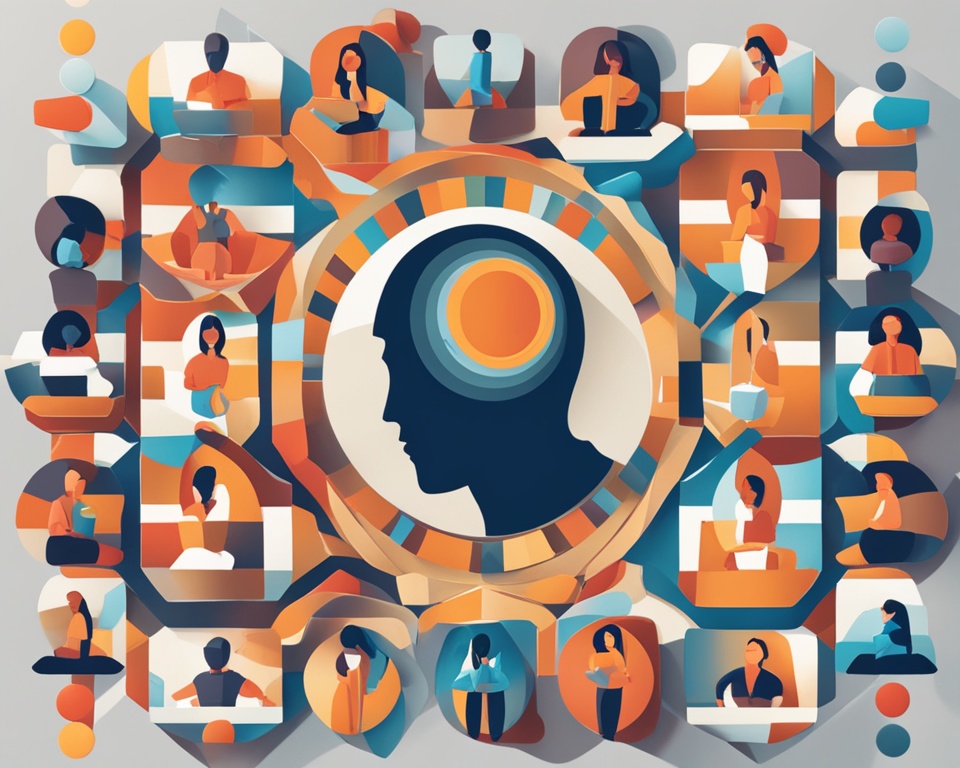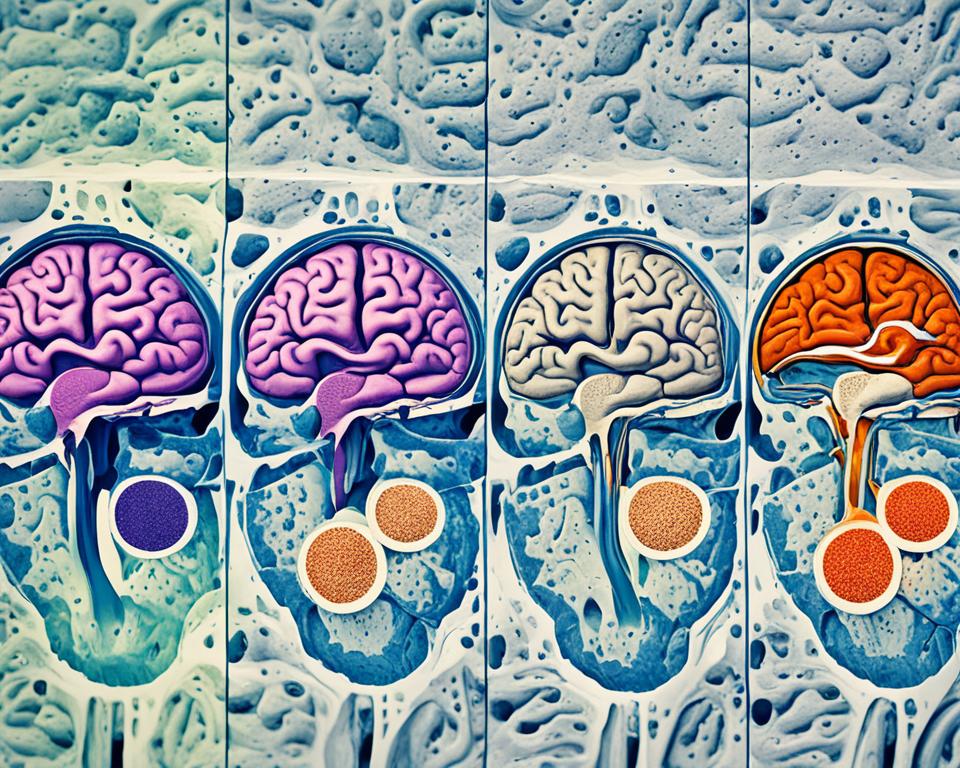Depression is a common mental health issue that can really affect someone’s life. But, there are many ways to help manage and beat depression. This article will look at different therapies, medicines, and natural ways to help you feel better.
Read interesting things at : climbing-gym-oz
Key Takeaways
- Understand the symptoms and causes of depression to better manage the condition.
- Explore evidence-based therapies like cognitive-behavioral therapy (CBT) and interpersonal therapy (IPT).
- Learn about the role of antidepressant medications in treating depression.
- Discover the benefits of lifestyle changes, such as exercise and proper nutrition, for depression management.
- Explore holistic and alternative treatments that can complement traditional approaches.
Understanding Depression
Depression is a complex mental health issue that affects many people around the world. It’s a mood disorder marked by ongoing sadness, hopelessness, and a lack of interest in things you used to enjoy. Knowing the signs and reasons behind depression is key to getting help and managing it.
Symptoms and Causes of Depression
Depression often shows as:
- Persistent feelings of sadness, emptiness, or hopelessness
- Loss of interest in activities that were once enjoyable
- Changes in sleep patterns, either sleeping too much or too little
- Fatigue and lack of energy
- Difficulty concentrating or making decisions
- Feelings of worthlessness or excessive guilt
- Thoughts of suicide or self-harm
Depression can come from many things, like genetics, brain chemistry, and life events. Some common reasons include:
- Chemical imbalances in the brain
- Traumatic life events, such as loss, abuse, or chronic stress
- Certain medical conditions, such as thyroid disorders or chronic pain
- Substance abuse or addiction
- Certain medications or medical treatments
Myths and Facts About Depression
There are many wrong ideas about depression that can make it harder to understand and treat. Some common wrong ideas are:
- Depression is a sign of weakness – Fact: Depression is a real medical condition that needs professional help.
- Depression is just a phase that will go away on its own – Fact: Depression is a long-term condition that often needs ongoing care.
- People with depression can just “snap out of it” – Fact: Depression can’t be wished away and needs a full treatment plan.
Understanding depression’s true nature and clearing up these wrong ideas helps people start on the path to getting the support and treatment they need for their mental health.
| Myth | Fact |
|---|---|
| Depression is a sign of weakness | Depression is a real medical condition that requires professional treatment |
| Depression is just a phase that will go away on its own | Depression is a chronic condition that often requires ongoing treatment and management |
| People with depression can just “snap out of it” | Depression is not something that can be willed away, and it requires a comprehensive treatment approach |
Therapy for Depression
Therapy is key in treating depression. It helps people manage their symptoms and feel better overall. Cognitive Behavioral Therapy (CBT) and Interpersonal Therapy (IPT) are two top therapies for depression.
Cognitive Behavioral Therapy (CBT)
Cognitive Behavioral Therapy is a proven method. It helps people change negative thoughts and behaviors that lead to depression. With a therapist’s help, clients learn to question negative thoughts and adopt better coping strategies. This leads to a better mood and improved daily life.
Interpersonal Therapy (IPT)
Interpersonal Therapy looks at how relationships and social interactions affect depression. It shows how personal relationships and communication can hurt mental health. Then, it helps improve these areas to lessen depression.
Cognitive behavioral therapy and interpersonal therapy are well-studied and effective for depression. They can be done one-on-one or in groups, based on what the person prefers and needs.
If you or someone you know is fighting with depression, talk to a mental health expert. They can offer the right counseling methods. With support and treatment, it’s possible to beat depression and live a happy life.
Antidepressant Medications
For people with mood disorders, antidepressants are key in fighting depression. These drugs help by fixing chemical imbalances in the brain. This can make symptoms of depression less severe and improve mood.
There are several types of antidepressants, like SSRIs, SNRIs, TCAs, and MAOIs. Each type works differently and has its own set of benefits and side effects. It’s important to talk to a healthcare professional before starting any antidepressant.
| Antidepressant Class | Examples | Mechanism of Action | Potential Benefits | Possible Side Effects |
|---|---|---|---|---|
| Selective Serotonin Reuptake Inhibitors (SSRIs) | Fluoxetine, Sertraline, Paroxetine | Inhibit the reuptake of serotonin, a neurotransmitter linked to mood regulation | Effective in treating depression, often have fewer side effects compared to other antidepressants | Nausea, dry mouth, drowsiness, sexual dysfunction |
| Serotonin-Norepinephrine Reuptake Inhibitors (SNRIs) | Duloxetine, Venlafaxine, Desvenlafaxine | Inhibit the reuptake of both serotonin and norepinephrine, another neurotransmitter involved in mood regulation | May be more effective than SSRIs in treating severe or treatment-resistant depression | Nausea, dry mouth, constipation, increased blood pressure |
| Tricyclic Antidepressants (TCAs) | Amitriptyline, Imipramine, Nortriptyline | Inhibit the reuptake of serotonin and norepinephrine, as well as other neurochemical processes | Effective in treating depression, but often have more side effects compared to newer antidepressants | Dry mouth, constipation, blurred vision, drowsiness, weight gain |
| Monoamine Oxidase Inhibitors (MAOIs) | Phenelzine, Tranylcypromine, Selegiline | Inhibit the enzyme monoamine oxidase, which breaks down neurotransmitters like serotonin, norepinephrine, and dopamine | May be effective in treating depression, particularly in individuals who have not responded to other antidepressants | Hypertensive crisis, dietary restrictions, interactions with other medications |
Choosing the right antidepressant and dosage depends on the individual’s needs and health history. It’s crucial to work closely with a healthcare provider to find the best treatment. They can help manage any side effects too.
Antidepressants are a key part of treating depression, but they’re not the same for everyone. Finding the right medication or treatment plan may take some time. Keeping in touch with a healthcare provider is key to safely and effectively managing depression with antidepressants.
the depression cure
Finding a single “depression cure” is often too simple and misleading. Depression is a complex issue that needs a detailed approach. There are many effective treatments, but recovering from depression is not always easy.
It’s key to look at the causes of depression, like genes, environment, and lifestyle. A good treatment plan combines therapies like cognitive-behavioral therapy and medication management with lifestyle changes. This mix can help people with depression feel better.
Remember, the “depression cure” doesn’t fit everyone the same way. Everyone’s depression is different, so treatment plans should be too. Getting help from mental health experts is crucial. They can guide you to the right treatment for your needs.
Looking for a single cure for depression is ongoing. But, it’s more important to empower people to take charge of their mental health. By trying different treatments, making lifestyle changes, and getting support, people can manage their depression and live a better life.
“The journey of depression is not a straight line; it’s more like a series of unpredictable twists and turns, with moments of progress and setbacks along the way. But with the right support and a willingness to explore different treatment options, recovery is possible.”
Lifestyle Changes for Depression Management
Managing depression needs a wide approach. Lifestyle changes are key in this fight. By adding healthy habits to our daily life, we can use exercise, physical activity, nutrition, and diet to help our mental health. These changes can lessen depression symptoms.
Exercise and Physical Activity
Exercise is a strong tool against depression. It releases endorphins, lifts mood, and boosts physical health. This helps our mental health too. Mixing different activities like running, lifting weights, and yoga helps manage depression better.
- Aim for at least 30 minutes of moderate-intensity exercise most days of the week.
- Engage in a mix of cardiovascular, resistance, and flexibility exercises to target different aspects of physical and mental health.
- Find activities that you enjoy, as this can increase the likelihood of sustained participation and adherence.
Nutrition and Diet
What we eat affects our mental health. Eating well can help our brain work better, lower inflammation, and make us feel happier. Eating whole foods like fruits, veggies, lean meats, and healthy fats helps manage depression.
| Nutrient | Benefits for Depression |
|---|---|
| Omega-3 fatty acids | Reduce inflammation and support brain health |
| B vitamins | Promote the production of neurotransmitters involved in mood regulation |
| Antioxidants | Protect the brain from oxidative stress and damage |
Adding these lifestyle changes to your daily life helps you take charge of your depression. Remember, being consistent and patient is important. It may take some time to see the full benefits.
Counseling and Support Groups
For those dealing with depression, counseling and support groups are key. They offer a chance to connect with others who get the struggles of mental health. This creates a community that understands and supports each other.
Counseling can be with a therapist or a group leader. It helps people find ways to cope, understand their depression, and grow. Through discussions and proven methods, it creates a safe place to share feelings and learn self-care.
The Benefits of Support Groups
Support groups add a lot to counseling. They bring people together who face similar issues. Sharing stories and support, they learn from each other’s experiences. Being in a group can make one feel less alone and part of a caring community.
- Gain a sense of community and belonging
- Learn new coping strategies from peers
- Receive emotional support and encouragement
- Develop a support network to rely on during difficult times
- Empower individuals to take an active role in their mental health journey
Choosing counseling, support groups, or both can greatly help with depression. These options offer valuable support and a community. They give people the tools and support to move forward in their recovery.
| Type of Support | Key Benefits |
|---|---|
| Counseling |
|
| Support Groups |
|

“Counseling and support groups have been invaluable in my journey to manage depression. The guidance and compassion I’ve received have been instrumental in my recovery.”
Mindfulness and Meditation Practices
Experts in mental health are now focusing on mindfulness and meditation to help with depression. These methods can be a strong addition to usual treatments. They help people become more aware of themselves, lower stress, and feel better overall.
Benefits of Mindfulness for Depression
Mindfulness means being fully in the moment and paying attention. It has shown to help with depression symptoms. By watching thoughts and feelings without judging them, people can understand themselves better. This leads to better ways of coping.
- Reduced rumination and negative thought patterns
- Improved emotional regulation and stress management
- Enhanced feelings of self-compassion and acceptance
- Increased sense of control and empowerment over one’s mental health
Many studies have found mindfulness-based therapies like MBCT and MBSR work well. They lessen depressive symptoms and help prevent relapse.
“Mindfulness helps us break out of the rumination cycle that often accompanies depression, allowing us to approach our thoughts and feelings with more acceptance and compassion.”
Adding mindfulness to daily life can make people with depression feel more present and resilient. It supports their recovery by helping them feel better overall.
Holistic and Alternative Treatments
Managing mental health conditions like depression is getting more attention for holistic and alternative treatments. These methods are different from traditional medicine, offering a full and personal way to get better. They include things like herbal remedies and acupuncture, which are great for those looking for a holistic treatment for their mental health.
Herbal supplements are a popular choice for fighting depression. Herbs like St. John’s Wort, Omega-3 fatty acids, and SAM-e might help ease symptoms. These alternative treatments aim to fix imbalances and improve emotional and physical balance.
- Acupuncture is another option for depression. It’s based on traditional Chinese medicine. People say it can help by fixing the body’s energy flow, making mood better and stress less.
- Aromatherapy uses essential oils to help with depression. Oils like lavender and chamomile are thought to calm the mind and body.
- Meditation and mindfulness are also being studied for depression. They focus on being fully aware and calm. These alternative treatments can help people feel more in control of their emotions.
| Holistic Treatment | Potential Benefits |
|---|---|
| Herbal Supplements | Addressing underlying imbalances, promoting overall well-being |
| Acupuncture | Restoring the body’s natural energy flow, improving mood and reducing stress |
| Aromatherapy | Calming the mind and body, promoting relaxation |
| Meditation and Mindfulness | Cultivating self-awareness, emotional regulation, and inner calm |
These holistic treatments might work differently for everyone, but they offer hope for those wanting an alternative treatment for their mental health. It’s key to talk to doctors to find the best options and make sure they’re safe and right for you.
Self-Help Strategies for Depression
Depression is a tough condition, but self-help can make a big difference. Journaling and self-reflection are key tools for better mental health. They help you understand yourself better and find ways to cope.
Journaling and Self-Reflection
Journaling lets you privately explore your thoughts and feelings. It’s a way to see your mental state clearly. By writing down your thoughts, you can spot patterns and track your progress. This can be very helpful and empowering.
It’s a chance to express yourself safely and understand your mind better. Writing down your experiences helps you see what you think and do. Keeping track of your mood and what affects it gives you control over your recovery.
Adding journaling and self-reflection to your self-help plan helps you take charge of your mental health. It goes well with any professional help you get. These methods increase self-awareness, kindness towards yourself, and your sense of control. All these are key in fighting depression.
“Writing in a journal can be a powerful tool for self-discovery and personal growth, especially for those struggling with mental health challenges like depression.”
| Benefits of Journaling for Depression | Improved Outcomes |
|---|---|
| Emotional expression and processing | Reduced symptoms of depression |
| Increased self-awareness and insight | Enhanced coping strategies |
| Tracking mood and progress | Stronger sense of personal control |
| Stress management and release | Improved overall mental health |
Preventing Relapse and Recurrence
Keeping up with progress and stopping depression from coming back is key for mental health. It’s important for people to find ways to spot early signs and use good coping skills.
Creating relapse prevention plans is a big step. These plans list steps to take when depression starts to come back. By knowing what triggers depression and having a plan, people can handle it better.
Also, regular mental health check-ins with doctors help keep an eye on things. Doing self-checks and using healthy ways to cope, like mindfulness and support groups, makes it easier to stay strong against depression.
| Strategies for Preventing Relapse | Benefits |
|---|---|
| Relapse prevention plan | Proactive approach to manage triggers and symptoms |
| Ongoing mental health support | Regular check-ins and treatment plan adjustments |
| Healthy coping mechanisms | Mindfulness, support groups, and self-care practices |
Using a full plan for relapse prevention helps protect mental health. It builds a strong base for long-term well-being. This lowers the chance of recurrence and helps people stay strong.
When to Seek Professional Help
Finding the right help for mental health can feel overwhelming. But knowing when to get professional help is key to dealing with signs of depression and improving well-being. By spotting the signs of depression and seeing the value of expert care, people can act early to care for their mental health.
Signs That Depression Treatment Is Needed
Spotting the signs of depression is the first move to get the right professional help. Important signs that it’s time to talk to a mental health expert include:
- Persistent feelings of sadness, hopelessness, or emptiness that last for more than two weeks
- Significant changes in sleep patterns, appetite, or energy levels
- Difficulty concentrating or making decisions
- Recurrent thoughts of death or suicide
- Withdrawal from social activities and relationships
- Unexplained physical symptoms, such as chronic pain or fatigue
If you notice these signs of depression, it’s vital to get professional help. This ensures you get the right diagnosis and a plan to help you. Ignoring these signs can make things worse and prolong your mental health issues.
“Seeking professional help is a sign of strength, not weakness. It takes courage to acknowledge the need for support and take the first steps towards a healthier, happier life.”
By recognizing the signs of depression and acting early to get professional help, you can take charge of your mental health. This starts a path of healing and growth.
Combining Treatment Approaches
Experts suggest a mix of treatments for depression. This includes therapy, medication, and lifestyle changes. Together, these can lead to better and lasting mental health.
Using cognitive-behavioral therapy (CBT) and antidepressant medications together can be powerful. CBT helps change negative thoughts and behaviors. Medications help balance brain chemicals, easing symptoms of depression.
Adding things like regular exercise, a healthy diet, and stress management can boost treatment results. These changes help you feel better overall and reduce the chance of getting depressed again.
| Treatment Approach | Benefits |
|---|---|
| Therapy (e.g., CBT, IPT) | Addresses psychological aspects, develops coping strategies |
| Medication (e.g., antidepressants) | Restores neurochemical balance, alleviates depressive symptoms |
| Lifestyle Changes (e.g., exercise, nutrition) | Enhances overall well-being, builds resilience, prevents relapse |
Combining different treatment approaches helps people with depression get better. This mix of therapies, meds, and lifestyle changes offers a full and tailored way to handle this condition.
“The most effective treatment for depression often involves a combination of therapies, medications, and lifestyle changes. This integrated approach addresses the multifaceted nature of the condition.”

Conclusion
This guide has shown us that finding a cure for depression is complex. It needs a personal and complete approach to mental health care. We’ve seen how therapies like cognitive behavioral therapy and interpersonal therapy work well. Also, antidepressant medications are a key part of treatment.
But it’s not just about medicine. Lifestyle changes like exercise, eating well, and mindfulness are crucial too. Counseling, support groups, and self-help are also important. They help people cope and get stronger.
Finding the right way to beat depression is about understanding that everyone is different. Working with health experts, people can make a treatment plan that fits their needs. With therapies, self-care, and support, those facing depression can find hope and healing.



